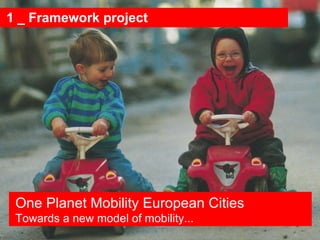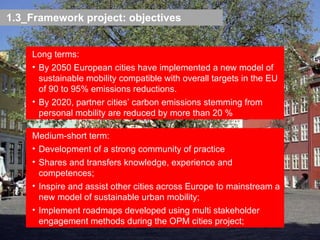Perl 100602 opm
- 1. 1 _ Framework project One Planet Mobility European Cities Towards a new model of mobility...
- 2. Framework project: WWF UK / One Planet Mobility programme 1.1_Promoters One planet innovation One planet city planning One planet education Green structure MalmÃķ project: WWF Sweden; Strategic Design Scenarios K3 University of MalmÃķ
- 3. 1.2_Context and general problem Dominance of car: Noise, pollution, CO2 Good practice is not mainstreamed Little understanding of the environmental consequences of different policies Complex social and political systems locked in status quo
- 4. 1.3_Framework project: objectives Medium-short term: Development of a strong community of practice Shares and transfers knowledge, experience and competences; Inspire and assist other cities across Europe to mainstream a new model of sustainable urban mobility; Implement roadmaps developed using multi stakeholder engagement methods during the OPM cities project; Long terms: By 2050 European cities have implemented a new model of sustainable mobility compatible with overall targets in the EU of 90 to 95% emissions reductions. By 2020, partner citiesâ carbon emissions stemming from personal mobility are reduced by more than 20 %
- 5. 1.4_Framework project: visions and strategic points Push policies Car traffic restrictions City toll Reduce available lanes Parking fees Speed limits Pull policies Better public transport Safe space for cycling and walking Prioritisation of bicycles Bicycle racks Land use policies Compact cities Polycentric cities Avoid urban sprawl No out-of-town retailers Mixed use neighbourhoods Vision: synergies between push, pull and land use policies + participation + communication...
- 6. 1.5_Framework project: local projects list 5 European partner cities provide leadership, commitment and capacity for driving long-term systemic change towards a new sustainable model of urban mobility through the development of a strong community of practice Barcelona Freiburg MalmÃķ Sofia Lille
- 7. 1.5.1 _ Local project 1 MalmÃķ creative stakeholder engagement process...
- 8. 1.6 Framework project: actions Co-evolution towards systemic change... Systemic change towards sustainable urban mobility CULTURAL CHANGE : De-acceleration, bicycle is the status symbol, less mobility is aspirational INNOVATION: Spur socio-technical innovation and experimentation (prototyping) for systemic transformation in mobility POLITICAL LEADERSHIP : Start systemic transformation with push, pull and land use policies Time
- 9. 1.6.1_Assement tool REAP = Resource and Energy Accounting Programme Calculates environmental pressures of peopleâs consumption activities Provides data at national, regional and local level Creates scenarios to evaluate the impact of policies
- 10. 1.6.2_Website and digital platform WWF will host a specific OPM web platform to share progress and experiences between partners cities OPM MalmÃķ Design Exercice is documented on SEP...
- 11. 1.6.3_Communication Initial UK One Planet Mobility process report
- 12. 1.7_Framework project: comments A large international framework programme...
- 13. 1.7.1_Timeline 2007 2012 2008 2009 2011 2010 Initial OPM UK programme REAP tool local developments... Involvment of the 5 first OPM cities... Pilot creative engagement process in MalmÃķ... Creative engagement BarcelonaâĶ Creative engagement LilleâĶ REAP scenarios all five cities
- 14. 1.7.2_Assessment Certain difficulties to address the systemic level beyond local measures; address cultural issues beyond infrastructure development; find collaboration basis between cities with different level of sustainable mobility levels; Successes in: initial involvement of the cities at higher political level and in funding part of the OPM programme; scenario-based approaches to integrate and assess local measures; design-based approaches in MalmÃķ in particular to connect with users, to stimulate strategic conversation and to foster large scale engagement
- 15. 2 _ Local Project MalmÃķ creative stakeholder engagement process...
- 16. 2.1.1_ MalmÃķ _ Context Leading city in terms of sustainability (sust. neighbourhood, bike lanes, public transports...); Look for next steps towards cultural changes and beyond cutting hedge infrastructures...
- 17. 2.1.2_ MalmÃķ _ Objectives Engage sustainable mobility stakeholders and citizens through a creative participative scenario building process...
- 18. 2.1.3_ MalmÃķ _ Visions and strategy
- 19. 2.1.4_ MalmÃķ _ Activities and results Ethnographic-like approach of family mobility Construction of stimulation scenarios Stakeholder engagement workshop larger engagement process at citizen level (in progress)
- 20. 3 _ Design roles Focus deeply on users living patterns; Building scenarios based on a mush-up of projects ideas; Design stakeholders engagement process.
- 21. 3.1_Design tools 1 Families mobility patterns investigation through user-centred design tools such as shadowing, mapping, mobility games, dairies, postcards, mood-boards, ideal city mock-up... Reconnect policy makers / poiticians with real users (instead of numbers)
- 22. 3.1_Design tools 2 Mobility scenarios based on a mush-up of new sustainable solutions from K3 MAH students co-designed with WWF and SDS...
- 23. 3.1_Design tools 3 Creative workshop to involve mobility stakeholders, let them appropriate the scenarios and reformulate them to fit the local context























